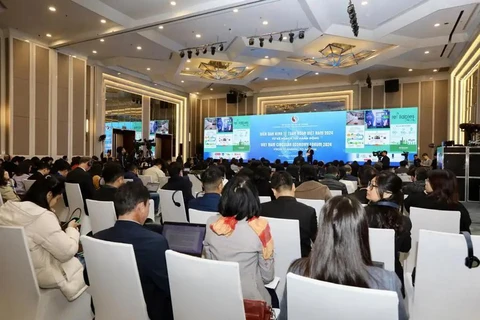
Sydney (VNA) - Vietnam's economy has continued to perform strongly in 2024, evidenced by the latest Asian Development Bank’s Asian Development Outlook, which highlights Vietnam’s impressive economic performance, said Hal Hill, an emeritus professor at the Crawford School of Public Policy at the Australian National University.
In a recent interview with the Vietnam News Agency (VNA), Hill noted that international rankings consistently showcase Vietnam's remarkable economic and social progress. He held that Vietnam is on track to achieve "upper-middle income economy" status - a milestone that would have seemed unthinkable in the late 20th century. However, he also cautioned that the country faces significant development challenges.
Globally the economic-security environment is highly volatile and uncertain, especially relations between the two global superpowers China and the US. Moreover, upper-middle income economies require major ongoing policy reforms, especially higher quality governance, stronger and more independent institutions (including the judiciary), and a level playing field for all enterprises, regardless of ownership. He also noted that the “easy phase” of export-oriented industrialisation has come to an end, wages are rising, the dualistic economic structure will need to be modified.
On the diplomatic front, Hill emphasised the importance of diversifying Vietnam’s economic and strategic partnerships in an era of global uncertainty. In 2024, Vietnam upgraded its diplomatic ties to comprehensive strategic partnerships with Australia (March), France (October), and Malaysia (November). These milestones, he said, are significant but should not remain merely symbolic. Instead, they must translate into actionable outcomes, particularly in fostering stronger business-to-business relationships.
According to the expert, Australia and Vietnam have a close working relationship which is likely to grow quickly, with the Australian Vietnamese community playing an important facilitating role. But Australian investment abroad continues to go mainly to traditional business partners, especially the US and the UK, thereby missing out on the remarkable dynamism in Southeast Asia.
For his part, Layton Pike, a member of the Australia-Vietnam Policy Institute’s advisory board said that balancing regional and global relations is a prominent feature of Vietnam's foreign policy. He expressed confidence that after the leadership transition in 2024, the Southeast Asian nation will continue to navigate effectively in an increasingly complex geopolitical context in the coming years./.






















